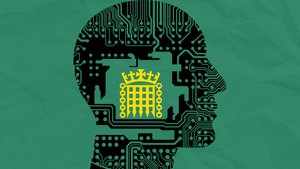The House Of Lords has yet again voted against the government in a bid to get transparency obligations for AI companies inserted into the Data Bill - the third time now that this has happened.
Support in the Lords for an amendment proposed by film-maker Beeban Kidron - which seeks to force AI companies to declare what copyright protected works they have used when training their models - has grown slightly, with yesterday’s vote going 287 in favour with 118 against, compared to 272 in favour and 125 against in last week’s vote.
Presenting the latest version of her amendment in Parliament, Kidron remained steadfast in her criticism of the UK government’s approach to AI and copyright. “Ministers talk about balancing the interests of AI and creative companies, as if that is reasonable”, she told the House, “but the idea is a little extraordinary”.
“No other industrial sector in the UK”, she added, “is required by government policy to give its property or labour to another sector that is in direct competition with it, on a compulsory basis, in the name of balance”.
The latest revision of Kidron’s amendment, connects the introduction of an AI transparency obligation to upcoming reports on copyright and AI that the government has already committed to produce. If the government still opposes her proposal, she added, that commitment will look like a “political gesture to push tackling widespread theft of UK copyright into the long grass”.
The creative and copyright industries - including the music industry - want AI companies to be forced to declare what copyright protected works they have included in their training datasets. That clarity would make it easier for bigger copyright owners to sue AI firms that have used their content without permission.
The government isn’t necessarily opposed to transparency obligations for AI companies, but says that the copyright issues posed by AI, including around transparency, should be dealt with via bespoke legislation, rather than being rushed through in the Data Bill.
Both the House Of Lords and the House Of Commons must approve the Data Bill for it to become law, and the government has been using its big majority in the House Of Commons to remove the AI transparency measures added to the bill in the Lords.
Last week it argued there was a cost associated with delivering Kidron’s proposals and the Commons can remove measures added in the Lords if they involve public expenditure.
Ministers have pledged to deal with the transparency obligations of AI companies down the line alongside other copyright matters, informed by their recent consultation on copyright and AI, arguing that that is the better approach.
Reiterating that point in the Lords yesterday, minister Maggie Jones told the Lords, “it remains the government’s view that transparency cannot be considered in isolation”. Alongside transparency, she added, “we must also consider licensing, the remuneration of rightholders, the role of technical solutions, and any other number of issues relating to copyright and AI - this is why we consulted on all these topics”.
Jones insisted that she and her ministerial colleagues agree “this is an urgent issue which needs to be addressed”. However, all the copyright matters should be dealt with together, because “piecemeal regulation such as this is not the way to prioritise the protection of 2.4 million creatives”.
In a bid to placate its critics in Parliament, the government has added commitments in the Data Bill to publish reports on various AI and copyright matters on a set timeline. Kidron has capitalised on that by formally connecting her amendment to that existing work, mainly in a bid to remove the issues around any costs associated with her proposal.
As a result, the amendment now states that the government must introduce regulations forcing transparency on AI companies “within six months of the publication of the report on the use of copyright works in the development of AI systems” that is already required by the Data Bill.
“If the government are not willing to accept a time-limited outcome of their own report, we must ask again if the report is simply a political gesture to push tackling widespread theft of UK copyright into the long grass”, Kidron told the Lords. “In the real world, failing to accept a timeline means starving UK industries of the transparency they need to survive”.
She continued, “The government should have leapt at this opportunity to save a much-valued and valuable UK industrial sector, central to their own industrial strategy, but they have not”.
The latest version of her amendment, she added, would not only “provide certainty that a transparency regime will be forthcoming within eighteen months” of the Data Bill becoming law, but would also “signal once and for all that UK copyright law is indeed the law of the land”, meaning AI companies must get permission before making use of copyright protected works.
That fact has been confirmed by ministers during debates on the Data Bill, albeit “under duress”, she added, “but still they have taken no action to defend it”.

